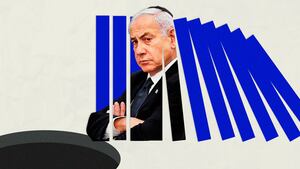Lawmakers in Israel voted on Monday to pass an extremely controversial bill to limit the powers of the country’s Supreme Court despite mass demonstrations against the move which rank among the biggest protests in Israeli history.
The new law means that the Supreme Court will no longer be able to overturn decisions made by the government on the grounds of “reasonableness.” It represents the first major victory for Prime Minister Benjamin Netanyahu’s ultranationalist government in a hotly contested, monthslong battle over the role of the judiciary and its powers in Israel’s future.
Opponents have denounced the changes as a threat to Israeli democracy, curbing vital checks and balances on governmental decisions. The government, in contrast, has painted the overhaul as a means of improving democracy by affording elected officials more autonomy over unelected judges, and a necessary measure given the court’s increasing interventions in political decisions over recent years.
The seismic vote Monday comes after the Israeli government was forced in March to shelve plans to allow lawmakers to overrule the court’s decisions and have a greater influence in who can become a Supreme Court justice. The climbdown came as huge street-level demonstrations against the proposals plunged Israel into crisis—scenes which have once again played out around the country in the run-up to the new vote.
Authorities arrested protesters and fired water cannons at people who had assembled outside the Knesset before the final vote took place on Monday. President Isaac Herzog acknowledged that the country was “in a state of national emergency” as last-minute preparations for the vote unfolded.
Netanyahu was himself present in the chamber as lawmakers voted, the day after he was rushed to the hospital early Sunday to have a pacemaker fitted for his heart. Opposition Leader Yair Lapid accused Netanyahu of being “a puppet on the strings of extremists and messianists” in the minutes after the judicial overhaul bill passed.
“This is a sad day, a day of our home’s destruction, of needless hatred, and look at the coalition celebrating,” Lapid added, according to The Times of Israel. The Movement for Quality Government, an Israeli rights watchdog, similarly slammed the decision. “The government of destruction has raised its malicious hand against the State of Israel; now it’s the Supreme Court’s turn to step up and prevent this legislation,” the group’s leader, Eliad Shraga, said in a statement.
Protesters also swiftly denounced the decision in gatherings outside the Supreme Court, reportedly chanting “shame” and “democracy or rebellion.” One activist encouraged those present to call on others to join them. “Anyone who isn’t here right now is not present at the most important battle in the history of the country,” the Times quoted them as saying.
Coalition members had earlier denounced the “siege” on parliament which saw violent clashes between police and protesters on Monday morning. At least 15 people were arrested in Jerusalem as authorities attempted to disperse the crowds, with the majority being detained for public order violations and roadblocks—though one person was reportedly taken into custody for biting an officer.
The unrest looks likely to continue. In the wake of the vote, the head of Israel's main public sector union vowed to meet with other officials to talk about declaring a general strike. Arnon Bar-David, the chairman of the Histadrut labor federation, said a “general labor dispute in the economy” would be activated “if necessary until a complete shutdown is achieved.”





